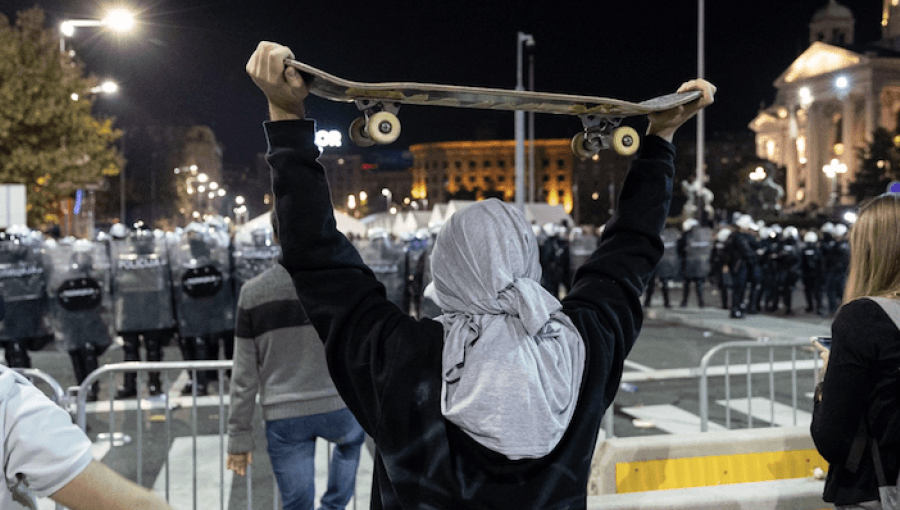We're loading the full news article for you. This includes the article content, images, author information, and related articles.
Violent protests targeting President Aleksandar Vučić's government underscore a global theme of public anger over alleged state negligence and corruption in major infrastructure projects, a concern that resonates with citizens in Kenya and across East Africa.

Hundreds of riot police descended on central Belgrade on Sunday, November 2, 2025, to separate thousands of clashing demonstrators, marking a severe escalation in Serbia's year-long political crisis. Supporters of President Aleksandar Vučić and a galvanized opposition movement faced off near the national parliament, hurling bottles and flares in a tense standoff that lasted for hours. The unrest boiled over following a weekend of mass mobilization, bringing the capital to a standstill and signaling a deepening challenge to Vučić's thirteen-year rule, which critics label as increasingly authoritarian.
The immediate trigger for the Belgrade clashes was a show of support for Dijana Hrka, the mother of a victim of the Novi Sad train station disaster, who began a hunger strike on Sunday. Her protest began symbolically at 11:52 AM, the exact time the station's concrete canopy collapsed on November 1, 2024, killing her son and 15 others. On Saturday, tens of thousands had gathered in Novi Sad, Serbia's second-largest city, for a solemn commemoration on the first anniversary of the tragedy. That event, organized by a student-led movement, transformed into one of the largest anti-government rallies in Serbia since the fall of Slobodan Milošević.
Protesters allege that the collapse was a direct result of rampant government corruption, negligence, and nepotism during the station's renovation. The youth-led movement, which has sustained demonstrations for a year, is demanding a transparent investigation, the release of detained activists, and early parliamentary elections to oust the populist government.
President Vučić and his ruling Serbian Progressive Party (SNS) have been in power since 2012. International observers and human rights groups have noted a steady erosion of democratic institutions and media freedom under his leadership. Freedom House, in its 2025 report, classifies Serbia as a "partly free" hybrid regime, citing pressure on the opposition and independent media. The government has responded to the protests with a mix of defiance and force. Pro-government media outlets have labeled student activists as "terrorists" backed by foreign powers, and authorities have detained hundreds of protesters in recent months. In a move seen as a direct counter-protest, Vučić's loyalists have occupied a tent camp outside the parliament building since March 2025, an area police have cordoned off from the public.
While the events are unfolding over 5,000 kilometers away, the core issues at the heart of the Serbian protests—accountability for public infrastructure failures, allegations of high-level corruption, and the state's response to dissent—are of significant global relevance. For Kenyans and the wider East African region, where governments are undertaking ambitious and costly infrastructure projects, the situation in Serbia serves as a potent case study. Public scrutiny over the integrity of construction contracts, safety standards, and the transparent use of public funds is a cornerstone of civic engagement in Kenya. The Serbian experience highlights how a single tragedy, when linked to perceptions of systemic corruption, can galvanize a population and pose a significant challenge to established political powers.
Diplomatic relations between Kenya and Serbia are described as traditionally friendly, with a Serbian embassy in Nairobi. However, relations have been tested recently. In March 2025, Serbia strongly protested Kenya's decision to recognize the independence of Kosovo, a move Belgrade deemed a "hostile act." This diplomatic friction exists alongside ongoing efforts to boost trade and educational ties, including a Serbian trade mission to Nairobi in September 2023.
The standoff in Belgrade continues as Dijana Hrka maintains her hunger strike, demanding justice for her son and the other victims. The student-led movement remains defiant, pressing its demand for snap elections ahead of the scheduled 2027 polls. President Vučić has so far rejected these calls, accusing the opposition of inciting violence. With both sides entrenched, the political future of the Balkan nation remains highly uncertain as the world watches to see if public pressure can force political change.
Keep the conversation in one place—threads here stay linked to the story and in the forums.
Sign in to start a discussion
Start a conversation about this story and keep it linked here.
Other hot threads
E-sports and Gaming Community in Kenya
Active 9 months ago
The Role of Technology in Modern Agriculture (AgriTech)
Active 9 months ago
Popular Recreational Activities Across Counties
Active 9 months ago
Investing in Youth Sports Development Programs
Active 9 months ago